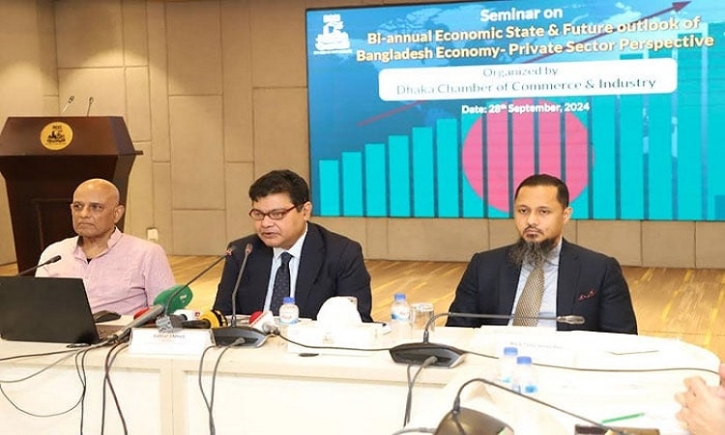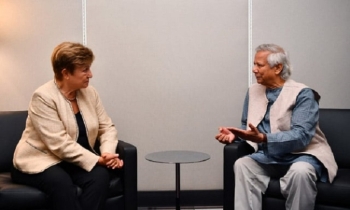Restoring macroeconomic stability, law & order, confidence among entrepreneurs vital: Speakers
BI Desk || BusinessInsider

Photo: Collected
Speakers at a seminar on Saturday said that restoring macroeconomic stability, law and order situation especially in industrial belts, and rebuilding confidence among entrepreneurs is now vital to streamline the country’s economy in the next development trajectory.
They also put emphasis on ensuring food security, containing inflation and boosting tax-GDP ratio among some of the key issues where the interim government should put urgent focus in the days ahead, reports BSS.
The speakers made the remarks at a seminar on “Bi-annual Economic State & Future Outlook of Bangladesh Economy-Private Sector Perspective” held at Dhaka Chamber of Commerce and Industry (DCCI) Auditorium in the capital.
Former Director General of Bangladesh Institute of Development Studies (BIDS) Dr KAS Murshid, Professor of Dhaka University and Executive Director for Research and Policy Integration for Development (RAPID) Dr Mohammad Abu Eusuf and Director (research), Chief Economist’s Unit, Bangladesh Bank Dr Md Salim Al Mamun spoke as panel discussants.
DCCI President Ashraf Ahmed made the key-note presentation on the topic.
Speaking on the occasion, noted economist Dr KAS Murshid said in the future, growth has to be broad-based while there is a need to think highly about education, health, and social justice.
“We’ve to be inclusive as only growth itself won’t be enough, rather quality of growth will make a sense,” he said.
Dr Murshid, also the chief of the taskforce to reframe the development strategies, said that for attaining quality growth, there is a need to continue investment in food security as well as in energy security.
In securing energy security, he said that energy mix and pricing policy is very much vital as the pricing policy over the years was a total mess. “We need to streamline it so that it becomes beneficial economically. We also need to ensure that there is no decision taken arbitrary and on ad-hoc basis,”
Besides, the former Director General of BIDS suggested that the government needs to have a national skills up-skilling policy where the thrust should be on technology.
He noted that over the next 10 years, AI and digital-based knowledge economy would transform production, employments and industrial ecosystem where the government needs to put urgent attention.
Noting that it would not be possible in the future to become competitive with the low-wage labour, he said that the country should have to go for generating more highly productive labour.
The noted economist also stressed on restoring law and order situation in the country as well as trust and confidence among the entrepreneurs and industrialists, focusing more on broad-based growth, undertaking some regulatory reforms, putting more focus on research and development, diversifying exportable items and markets and attracting more investment especially FDI.
Prof Dr. Mohammad Abu Eusuf said maintaining macroeconomic stability is now crucial than ever for the sake of overall economic development.
“Moreover, we’ve to have actual realistic data of number of population, GDP size and other statistical components to research the actual scenario of the economy,” he added.
Prof Eusuf termed three ‘R’ namely RMG, remittance and rice production as the most important issues now while underscored the need for product diversification for increased export growth.
He further said that if the leather sector of Bangladesh gets adequate support, then it can fetch at least $10 billion a year.
The RAPID Executive Director also urged for enhancing tax-GDP ratio, revenue from the direct tax, preparing a roadmap for 5 to 10 years and thus taking action plan.
Besides, he proposed for recognizing the expatriate Bangladeshis as ‘remittance warriors’ through providing them with extra facilities as the inward remittance flow is likely to hit $27 billion to $30 billion in this financial year.
He also underscored the need for better coordination among the monetary policy, fiscal policy and market management.
Dr. Md. Salim Al Mamun said that holistic approach has been taken for the reforms in the financial sector.
“The Bangladesh Bank has also been trying to modernize concerned policies. To contain inflation, BB has taken few measures like policy rate hike, tightening monetary policy etc. which may bring positive results soon,” he added.
He also echoed that the main challenge is now to face the challenge of macroeconomic stability.
Regarding the Central Bank’s current strategy of higher interest rates and tighter liquidity management, DCCI President Ashraf Ahmed suggested that the strategy should be reversed as soon as inflation comes under control.
He expected that the balance of payment issues to be resolved soon, the trend of devaluation of taka will come down once US dollar rate falls which could help cut the energy prices as well.
He underscored the importance of mid-term reforms in various policies, investments and operating procedures of various government bodies for creating a better business environment and investment climate.
“We’re also witnessing few issues with NPL within a small segment of the banking system—reportedly only ten banks are badly affected, indicating that the remaining banks are in acceptable health.” he added.
Ashraf pointed out that due to high interest rate, higher exchange rate and increasing cost of capital, the actual effective credit flow to CMSME sector has been on a downward trend.
He requested to maintain the flow of loan disbursement in the CMSME sector so that they have enough working capital in hand.
To control inflation, he suggested for strong domestic supply chain mechanism, minimizing wastages, improvement of age-old market logistic system and implementing modern market mechanism in place.
Regarding the labour unrest in the industrial belt including in Ashulia, the DCCI president termed it as ‘fearful’ and said that such situation could not be allowed to continue. Otherwise, growth and employment generation will be affected, he added.
Ashraf also termed electronics and semiconductor sector as one of the most promising areas in the export basket after RMG.
























